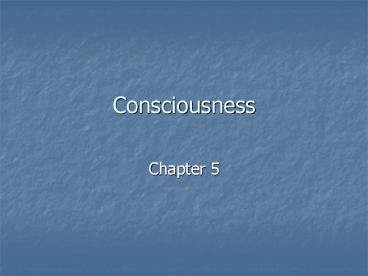Consciousness - PowerPoint PPT Presentation
1 / 31
Title:
Consciousness
Description:
Consciousness Chapter 5 Can consciousness be studied? John Watson (Behaviorism) and William James (Functionalism) said no Not observable Consciousness as a Construct ... – PowerPoint PPT presentation
Number of Views:45
Avg rating:3.0/5.0
Title: Consciousness
1
Consciousness
- Chapter 5
2
Can consciousness be studied?
- John Watson (Behaviorism) and William James
(Functionalism) said no - Not observable
3
Consciousness as a Construct
- A construct is something we cannot see, touch, or
measure directly - i.e. intelligence, emotion
- Constructs effect behavior
4
Meanings of Consciousness
- Awareness
- Sensory awareness
- Inner awareness
- A sense of self
5
Consciousness as Sensory Awareness
- Using your senses to be aware
- Can be unaware of sensory stimulation
- Is that stimulation a part of your conscious
self? - Unusual stimuli and sudden changes
6
Consciousness as Direct Inner Awareness
- Imagine jumping in a lake
- Imagine jumping off a building
- To figure out complex thoughts one must be aware
of the things happening inside of them - Ethical or abstract concepts
7
Consciousness as a Sense of Self
- 3 levels of sense of self
- Awareness is more limited in these 3 levels
8
Preconscious Level
- Taking ideas not in your direct awareness and
giving them priority - Store information - recall
9
Unconscious Level
- Unavailable to awareness in most circumstances
- Hidden information party example p. 105
- Freud unconscious desires
- Mental strategies defense mechanisms
10
Non-conscious Level
- Blinking, breathing, etc.
- If we had to concentrate on all of these things
11
Altered States
- Drugs
- Meditation
- Hypnosis
- Dozing off
12
Section 2 Sleep and Dreams
- We spend 33 of our lives sleeping
- Circadian Rhythms biological clocks
- Sleepiness / wakefulness
- Blood pressure
- Temperature
- Can be harmful if disrupted continuously
13
Sleep-Wake Cycle
- A full sleep-wake cycle is 24 hours
- Removal of certain stimuli can extend this cycle
or vice versa
14
Stages of Sleep
- Stages are defined by brain wave patterns
- Measured by electroencephalograph (EEG)
- Brain waves are cyclical
- Beta, alpha, theta, delta 4 patterns of brain
waves - Falling asleep
- Gradual change from beta to alpha
- Sensations of falling asleep
15
Stages
- Stage 1 lightest sleep stage
- Slowing of brain waves
- Brief dreamlike images
- Easily awakened
16
Stages
- Stage 1 lasts 30-40 mins
- After stage 1 we pass through 2,3, and 4
- 3 and 4 are the deepest sleep delta waves
17
Stage Transition
- 30 minutes in stage 4
- Transition back to stage 1 the trip through all
4 cycles takes a total of 90 minutes - When we enter back towards stage 1 some funny
things happen
18
REM
- Breathing becomes irregular
- Blood pressure rises
- Heart beats faster
- Similar to stage one this is REM sleep
- Other stages are called NREM
- 8 hour sleep 5 rotations up and down stages
- Final REM sleep may last 30 mins or longer
19
Why do we sleep?
- Body reset
- Resistance to infection
- Life happenings
- What happens if we refused to sleep?
20
Purposes of REM Sleep
- Brain cell exercise in adults
- Brain development in babies
- Better learning capabilities
- Comprehension
21
Dreams and REM Sleep
- Some people dream in black and white, some in
color - Every time we are in REM sleep we dream
- Some are more realistic than others
- Some people remember dreams, while others have a
hard time - States of consciousness may affect this
22
Freudian View
- Freud said that dreams are wishes your heart
makes - People dream in symbols
- This allows people to deal with issues that may
be too painful to deal with consciously
23
Biopsychological View
- Some psychologists believe that dreams are more
biological - Neurons fire at random in the brain that control
vision and movement - This could explain why we often dream of things
that happened during the day or people we
interacted with
24
No Set of Rules
- Psychologists agree that there is no set of rules
that defines how to interpret dreams
25
Sleep Problems
- Insomnia the inability to sleep
- racing mind syndrome
- Forcing sleep makes it worse
- Occasional insomnia is common
- Several tips
26
Nightmares and Night Terrors
- Many reasons for nightmares
- Traumatic events
- Anxious / Depressed
- Profession or Activity
- Why do nightmares occur?
27
Night Terrors
- Night terrors are turned up nightmares
- May cause physical effects while sleeping
- Vague after occurrence
- Night terrors occur in stage 3 or 4
- Happen in first couple of sleep cycles
28
Sleepwalking
- Sleepwalking is often associated with children
- Urban legend says that waking them may cause
irrational behavior - Should be supervised if possible because they
could hurt themselves
29
Sleep Apnea
- Breathing interruption that happens at night
- Usually do not wake up completely
- Once they start to breathe normally they go back
to sleep - Occur when nasal passages are blocked
- May cause snoring
- May be related to SIDS
30
Narcolepsy
- People fall asleep no matter what time or where
they are - Several short naps and certain drugs have been
known to treat this disorder - Can be dangerous
31
(No Transcript)































